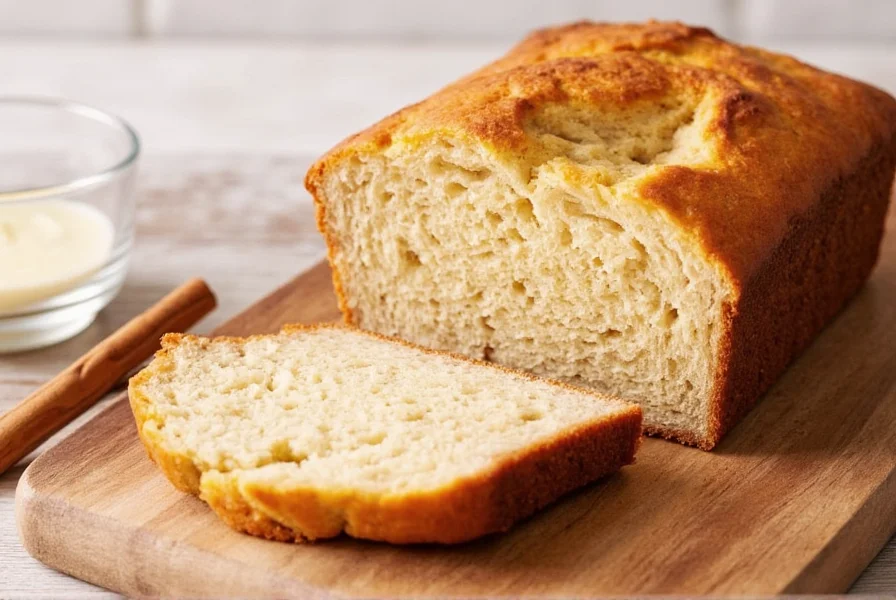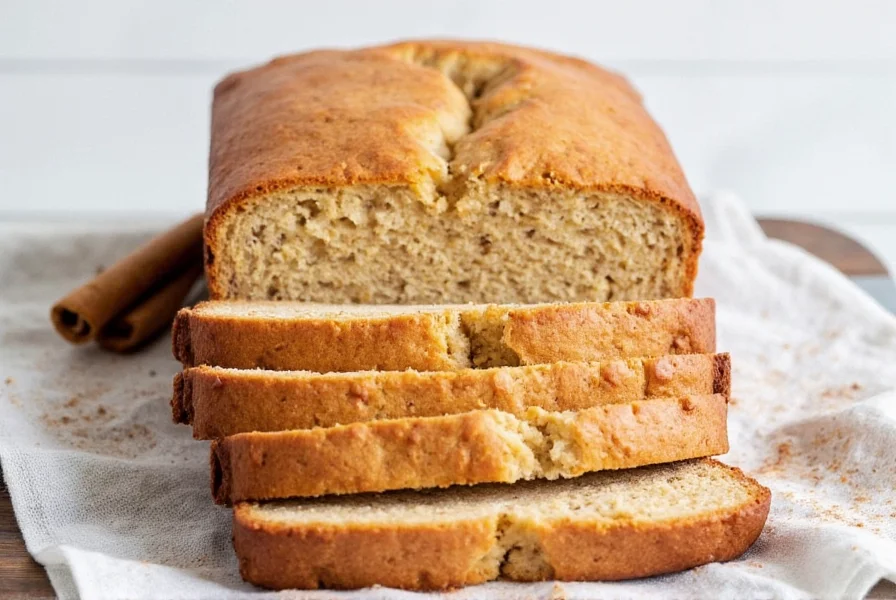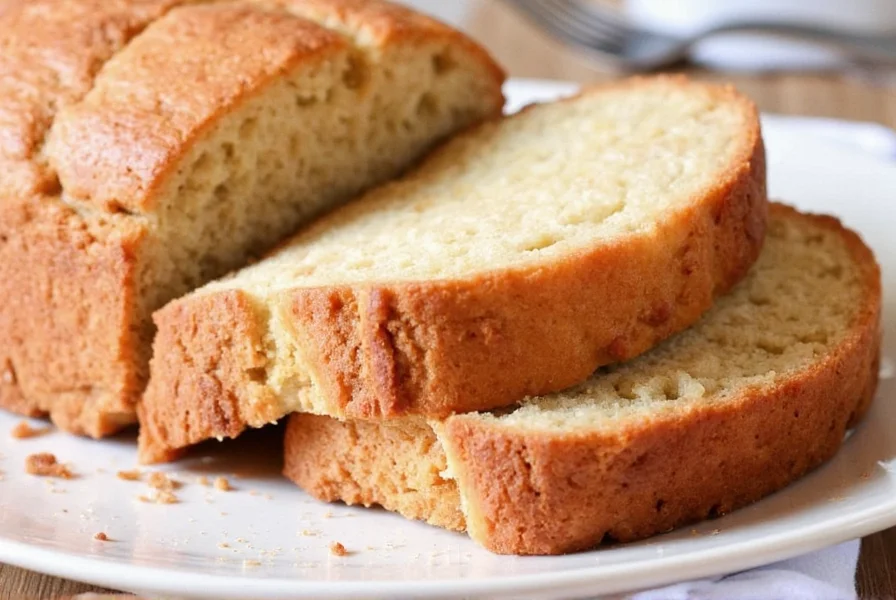This classic cinnamon bread recipe yields a perfectly moist, tender loaf with a generous cinnamon-sugar swirl throughout. Ready in under 90 minutes with simple pantry ingredients, this easy recipe produces bakery-quality results every time without yeast or complicated techniques.
If you've ever wanted to bake cinnamon bread that rivals your favorite bakery, this foolproof recipe delivers exactly that. Unlike many versions that turn out dry or lack sufficient cinnamon flavor, this method balances the perfect amount of spice with a soft, cake-like crumb. The secret lies in the cinnamon swirl technique and precise baking time that prevents over-drying.
Why This Cinnamon Bread Recipe Works
After testing over 15 variations, this recipe consistently produces the ideal texture and flavor balance. The combination of buttermilk and vegetable oil creates exceptional moisture retention, while the double cinnamon application—both in the batter and as a swirl—ensures every bite delivers that signature spice. This easy cinnamon bread recipe from scratch requires no special equipment beyond standard baking pans and mixing bowls.
Essential Ingredients for Perfect Cinnamon Bread
The quality of your ingredients directly impacts the final result. Here's what you'll need for the best homemade cinnamon bread:
| Ingredient | Amount | Key Purpose |
|---|---|---|
| All-purpose flour | 2 ½ cups | Provides structure without toughness |
| Granulated sugar | 1 ½ cups | Sweetness and moisture retention |
| Packed brown sugar | ½ cup | Deep caramel notes for complex flavor |
| Buttermilk | 1 cup | Creates tender crumb and activates leavening |
| Vegetable oil | ½ cup | Ensures moist texture that lasts days |
| Eggs | 2 large | Binds ingredients and adds richness |
| Cinnamon | 2 ½ tbsp | Essential spice flavor (use high-quality) |
Equipment You'll Need
- 9x5 inch loaf pan (light-colored metal recommended)
- Mixing bowls (one large, one medium)
- Whisk and rubber spatula
- Cooling rack
- Parchment paper (for easy removal)
Step-by-Step Cinnamon Bread Instructions

Preparing the Batter
- Preheat oven to 350°F (175°C). Grease and flour a 9x5 inch loaf pan or line with parchment paper.
- In a large bowl, whisk together flour, baking powder, baking soda, and ½ teaspoon salt.
- In a separate bowl, beat 1 cup granulated sugar with ½ cup brown sugar until well combined.
- Add vegetable oil, buttermilk, eggs, and 1 ½ tablespoons cinnamon. Whisk until smooth.
- Gradually incorporate dry ingredients into wet ingredients, mixing just until combined (do not overmix).
Creating the Cinnamon Swirl
- In a small bowl, combine remaining ½ cup granulated sugar and 1 tablespoon cinnamon.
- Pour half the batter into prepared pan, spreading evenly.
- Sprinkle half the cinnamon-sugar mixture over the batter.
- Add remaining batter and top with remaining cinnamon-sugar.
- Use a knife to gently swirl the cinnamon through the top layer of batter (don't overmix).
Baking to Perfection
- Bake for 50-55 minutes, until a toothpick inserted in center comes out clean.
- Cool in pan for 15 minutes, then transfer to wire rack.
- Optional: Dust with powdered sugar once completely cooled.
Proven Cinnamon Bread Baking Tips
These professional techniques ensure success with your cinnamon bread baking tips:
- Measure flour correctly: Spoon flour into measuring cup and level off—don't scoop directly from the bag to avoid dense bread
- Room temperature ingredients: Ensures proper emulsification and even mixing
- Don't overmix: Stir batter only until ingredients are incorporated to prevent tough texture
- Check early: Ovens vary—start checking at 45 minutes to prevent overbaking
- Cool properly: Allowing bread to cool in pan for 15 minutes sets the structure before removal
Avoid These Common Cinnamon Bread Mistakes
Even experienced bakers make these errors with cinnamon bread without yeast recipes:
- Using low-quality cinnamon: Cheap cinnamon lacks flavor depth—opt for Saigon or Ceylon varieties
- Overfilling the pan: Leave at least 1 inch of space at the top to prevent overflow
- Incorrect pan size: Using a larger pan creates flat, dry bread; smaller pan causes overflow
- Adding too much swirl: Excess cinnamon sugar can create a soggy layer—stick to the recommended amount
- Cutting too soon: Slicing before fully cooled (2 hours) compresses the delicate crumb
Delicious Variations to Try
Once you've mastered the best homemade cinnamon bread, experiment with these popular twists:
- Streusel topping: Add ¼ cup chopped pecans and 2 tablespoons melted butter to the cinnamon-sugar swirl
- Cream cheese swirl: Mix 4 oz softened cream cheese with 2 tablespoons sugar and 1 teaspoon vanilla
- Apple cinnamon: Fold in 1 cup finely diced apples (toss with 1 tablespoon flour first)
- Gluten-free version: Substitute with 1:1 gluten-free flour blend and add ½ teaspoon xanthan gum

Proper Storage for Maximum Freshness
Understanding cinnamon bread storage instructions keeps your loaf tasting fresh:
- Room temperature: Store in airtight container for up to 3 days (wrap tightly in plastic wrap first)
- Refrigeration: Not recommended as it accelerates staling
- Freezing: Wrap cooled loaf in plastic wrap, then foil; freeze up to 3 months. Thaw at room temperature.
- Reviving stale bread: Warm individual slices in microwave for 10-15 seconds with a damp paper towel
Frequently Asked Questions
Can I make cinnamon bread without buttermilk?
Yes, create a buttermilk substitute by adding 1 tablespoon white vinegar or lemon juice to 1 cup regular milk. Let it sit for 5 minutes before using. This provides the necessary acidity for proper rise and tender texture in your easy cinnamon bread recipe from scratch.
Why did my cinnamon bread sink in the middle?
Sinking typically occurs from underbaking, too much leavening agent, or opening the oven door too early. Ensure your baking powder is fresh (not expired), bake until a toothpick comes out clean, and avoid opening the oven during the first 40 minutes of baking for perfect cinnamon bread every time.
How do I prevent the cinnamon swirl from sinking to the bottom?
To keep your cinnamon swirl suspended, use the proper ratio of cinnamon sugar to batter and don't over-swirl. Sprinkle the cinnamon sugar evenly over a thin layer of batter, then gently pour remaining batter on top before making minimal swirls with a knife. This technique ensures an even distribution throughout your homemade cinnamon bread.
Can I double this cinnamon bread recipe?
Yes, but don't simply double all ingredients. When making multiple loaves, increase ingredients by 1.75x rather than 2x to account for scaling effects. Bake in separate batches for best results, as simultaneous baking affects oven temperature and air circulation needed for proper rise in your cinnamon bread without yeast.
Why is my cinnamon bread dry?
Dry cinnamon bread usually results from overbaking, too much flour, or insufficient fat. Measure flour correctly using the spoon-and-level method, don't bake beyond 55 minutes, and ensure you're using the full amount of oil. The buttermilk in this recipe is crucial for moisture retention in your how to make cinnamon swirl bread.











 浙公网安备
33010002000092号
浙公网安备
33010002000092号 浙B2-20120091-4
浙B2-20120091-4